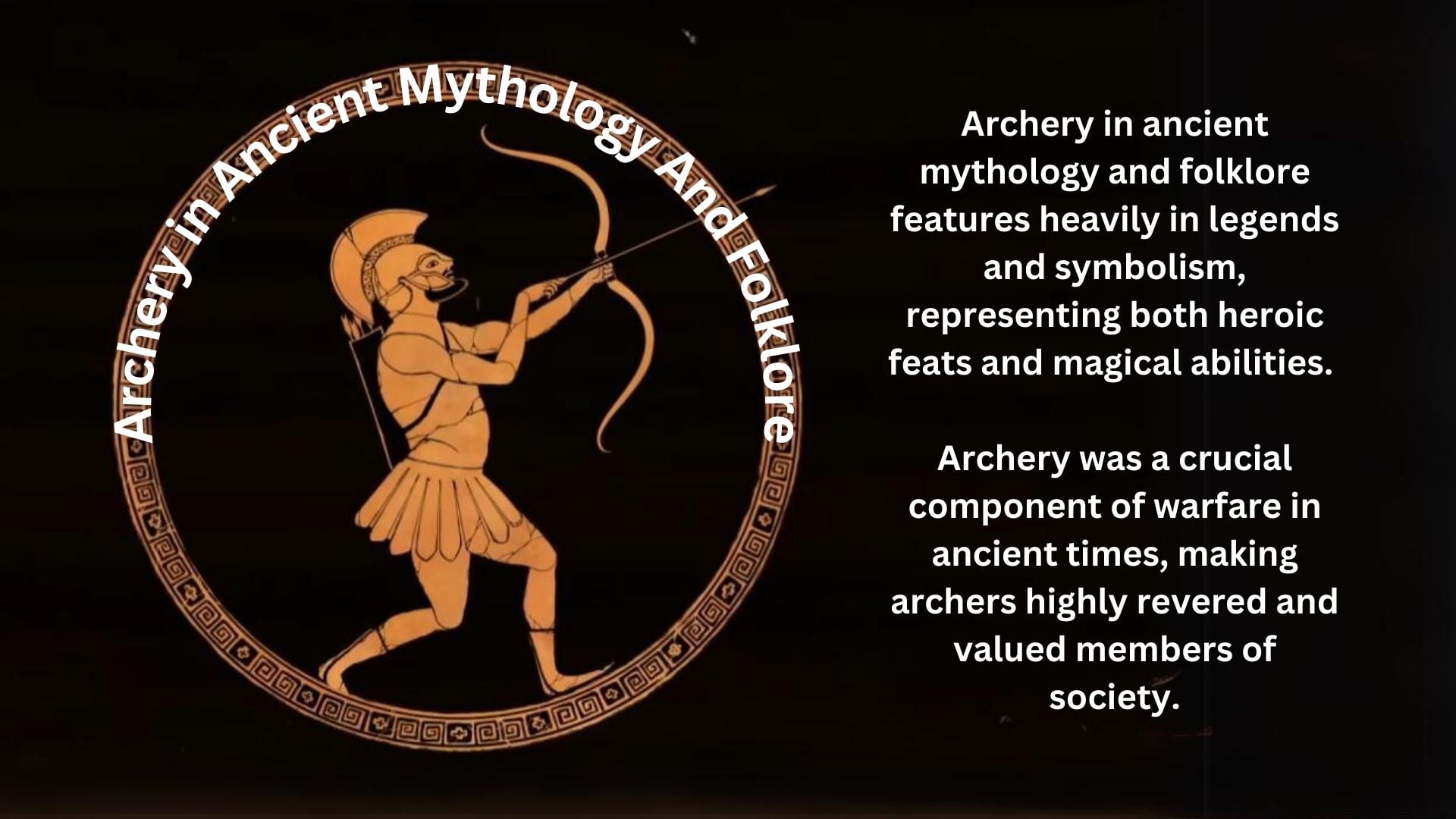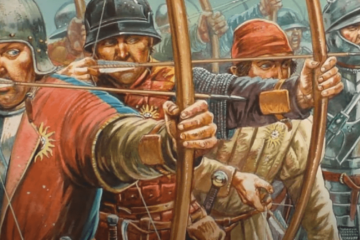Archery in ancient mythology and folklore features heavily in legends and symbolism, representing both heroic feats and magical abilities. Archery was a crucial component of warfare in ancient times, making archers highly revered and valued members of society.
Many famous mythological heroes, such as Apollo, Artemis, and Cupid, were known for their exceptional archery skills, using their bows and arrows to overcome seemingly impossible challenges and enemies. Archery also played a significant role in magical and mystical traditions, with mythical beings using enchanted arrows to invoke love, healing, or death.
From the epic tales of Greek and Roman mythology to the legends and folklore of native american tribes, archery remains an enduring symbol of ancient cultures and their beliefs.
The Mythical Archers Of Ancient Greece
Archery has a long and illustrious history in many ancient cultures, and none more so than in ancient Greece. The great archers and their stories have become legendary in Greek mythology. We will delve into the origins of some of the most renowned archers of ancient Greece, including Apollo, Artemis, and Philoctetes.
Apollo: The God Of Archery
Apollo is one of the most important gods in Greek mythology, and he is often associated with archery, music, poetry, and the sun. Here are some key points about Apollo as the god of archery:
- Origin story and attributes: Apollo was the son of Zeus and Leto, and he was born on the island of Delos. He is depicted as a handsome young man with long hair, and his symbol is a bow and arrow. He is often depicted wearing a wreath of laurel leaves on his head and carrying a lyre.
- Role in Greek mythology: Apollo is considered the god of light, music, and healing. He is also known for his skills in archery. According to legend, Apollo trained with the centaur Chiron, and he was able to shoot arrows with deadly accuracy. Apollo was said to have killed the giant Tityos with his arrows when he attempted to rape Leto, and he also killed the Cyclops that made the thunderbolt for Zeus.
Artemis: The Goddess Of Hunting And Archery
Artemis was the twin sister of Apollo and the goddess of hunting, wild animals, childbirth, and virginity. Here are some key points about Artemis as the goddess of archery:
- Origin story and attributes: Artemis was born on the island of Delos to Zeus and Leto. She is often depicted as a beautiful young woman with a bow and arrow in her hand. Her symbol is a crescent moon, and she is often associated with the moon and the hunt.
- Role in Greek mythology: Artemis was known for her skill in archery from a young age. She was said to have asked her father, Zeus, for a bow and arrow when she was just three years old. She is also known for her fierce protection of her virginity, and she punished anyone who tried to defile it. According to legend, Artemis and Apollo were the only two gods who could shoot arrows through seven trees with a single arrow.
Philoctetes: The Greek Hero
Philoctetes was a Greek hero who played an important role in the Trojan War. Here are some key points about Philoctetes as a Greek hero:
- Origin story and attributes: Philoctetes was the son of King Poeas of Meliboea. He was one of the suitors of Helen, and he joined the Greek expedition to Troy. According to legend, he was bitten by a snake on the way to Troy and was abandoned on the island of Lemnos by his fellow Greeks.
- Role in Greek mythology: Philoctetes played an important role in the Trojan War. He was said to have the bow and arrows of Heracles, which were needed to capture Troy. After being abandoned on Lemnos for ten years, he was eventually rescued by Odysseus and Diomedes. Philoctetes then used his bow and arrows to wound Paris and kill many Trojan warriors.
Archery was an important part of ancient Greek mythology, and the archers in these myths have become legendary figures. The stories of Apollo, Artemis, and Philoctetes have been told and retold throughout the ages. They will continue to inspire and awe archery enthusiasts for many years to come.
Archery In Norse Mythology
The norse mythology is replete with tales of gods and goddesses, warriors, and hunters. Archery was an integral part of their daily lives, and the gods and goddesses often relied on it to protect themselves from their enemies and hunt for food.
Let us take a look at two of the most prominent figures in Norse mythology who were skilled archers.
The Legend Of Odin, The All-Father
Odin was the chief of all the Norse gods and the creator of the universe. He is often depicted as an old, wise man with a long beard, missing an eye. Odin’s missing eye is a symbol of his willingness to sacrifice anything for knowledge and wisdom, including his own eye.
Origin Story And Attributes
- Odin was a skilled archer and often used a bow and arrow made of yew.
- He was also the god of war, poetry, and wisdom.
- Odin was known for his incredible physical prowess and his sharp intellect.
Role In Norse Mythology
- Odin’s role in Norse mythology was to guide and protect the other gods and humanity.
- He was also responsible for leading warriors into battle.
- Odin was often depicted carrying his spear and wearing his magical ring, draupnir.
The Goddess Skadi, The Hunter
Skadi was a powerful goddess and a skilled hunter who was often depicted with a bow and arrow. She was the goddess of winter, skiing, and mountains and was associated with the idea of endurance and survival.
Origin Story And Attributes
- Skadi was the daughter of a giant and was raised in the mountains.
- She was known for her exceptional skill with a bow and arrow.
- Skadi was also a master skier and considered one of the fastest and most agile in the norse world.
Role In Norse Mythology
- As a hunter, Skadi was often sought out by the other gods for her expertise and knowledge.
- She was also responsible for hunting down and punishing those who broke the laws of the gods.
- Skadi’s presence was often associated with cold, harsh winters and the power of the icy mountain peaks.
Archery played a significant role in Norse mythology, and it was often used to symbolize power, strength, and survival. The gods and goddesses who excelled in archery were revered for their skill and cunning, and their bows and arrows were considered powerful weapons imbued with magical properties.
It is fascinating to see how different cultures throughout history have interpreted and utilized the power of archery in their mythologies and legends.
Archery In Asian Mythology
The ancient art of archery has always been an instrument of war, hunting, recreation, and a symbol of power and nobility. From the evidence found in ancient literature, there are various interpretations of the role that archery played in ancient mythology and folklore across the world.
In this section, we explore the legends and symbolism behind archery in Asian mythology, specifically in Chinese and Hindu mythology.
The Chinese Legend Of Houyi, The Divine Archer
Origin story and attributes:
Houyi is a renowned figure in Chinese mythology, known for his superior archery skills and for saving humanity. According to legend, ten suns appeared in the sky, causing drought and famine, and to save humanity, Houyi was chosen to shoot down nine of the ten suns.
In addition to his impressive archery skills, houyi was known for his great strength, kindness, and wisdom.
Role in Chinese mythology:
For his bravery and skill, houyi was considered a hero of the people. He became the leader of the archers and was elevated to the status of a god after his death. He is worshipped by many in China, and his story is celebrated during the mid-autumn festival, where people gather to celebrate the full moon and feast on mooncakes.
The Hindu Epic Of The Ramayana: Rama And The Golden Bow
Origin story and attributes:
In Hindu mythology, lord Rama is depicted as a great archer. The Ramayana epic tells the story of how Prince Rama found the divine bow of lord Shiva, the pinaka, during his quest to save his abducted wife, Sita. The bow needed a considerable amount of strength to wield, but Rama proved to be the only one capable of wielding it.
He later used the bow to defeat the evil Ravana and rescue Sita.
Role in Hindu mythology:
Rama’s success with the pinaka bow reinforced his reputation as a skilled warrior. He was known for his prowess in archery, swordsmanship, and hand-to-hand combat. He became the seventh incarnation of the god Vishnu, and his story has been told and retold in various forms of literature, music, and dance in India and beyond.
In both Chinese and Hindu mythology, archery played a crucial role and was revered as a symbol of strength and heroism. The legends of Houyi and lord Rama, both skilled archers, inspire and influence generations even today.
Symbolism Of Archery In Mythology
Archery In Ancient Mythology And Folklore: Legends And Symbolism
Archery has always held a prominent place in ancient mythology and folklore, representing various symbols and beliefs. Let’s explore the symbolism of archery in mythology.
Archery As A Symbol Of Precision And Accuracy
- In mythology, archery represents precision and accuracy in hunting and warfare.
- It also portrays the idea of having a clear aim and achieving that goal with confidence.
- Archery is considered a symbol of perfection, as the archer must be in complete control of their body and mind.
As A Tool For Heroes And Warriors
- Archery is often associated with mythical heroes like Apollo and Robin Hood, who use their archery skills to protect and serve their people.
- In ancient Greece, the god Apollo was regarded as the archer god and was often depicted with a bow and arrow.
- In Celtic mythology, cúchulainn was known for his extraordinary archery skills that led to his victory in many battles.
Archery As A Representation Of Focus And Determination
- Archery is believed to symbolize focus and determination as it requires utmost concentration and patience.
- The act of pulling the bowstring and releasing the arrow represents the idea of letting go of distractions and focusing solely on the target.
- Archery is also considered a representation of overcoming obstacles in life as the archer must be determined to improve their skills.
Archery has been an integral part of ancient mythology and folklore, representing various symbols and beliefs. It symbolizes precision, accuracy, determination, and focus, and is often associated with heroic characters. Its longstanding connection to cultural mythologies is a testament to the intrigue and importance that archery has played throughout the ages.
Frequently Asked Questions Of Archery In Ancient Mythology And Folklore: Legends And Symbolism
What Is The Mythology Behind Archery?
Archery in mythology is rich with cultural symbolism and legendary tales of heroism and adventure. Some myths feature powerful deities or mythological creatures as skilled archers.
How Has Archery Been Represented In Folklore?
Archery appears in folklore as a tool of survival and a means of protection. From Robin Hood to the Greeks and Romans, archery has been an essential part of many cultures.
What Symbolism Is Associated With Archery?
Archery represents strength, courage, skill, and control. The bow and arrow symbolize a balance between power and precision and are often used to denote victory, especially in battle.
Who Were Famous Archers In Ancient Mythology And Folklore?
Archer heroines include the Greek goddess Artemis, the Celtic warrior queen Boudica, and the Amazonian warrior women. In Japanese mythology, the hero archer ushi no to is known for his exceptional accuracy.
What Role Did Archery Play In Ancient Cultures?
Archery played a significant role in ancient cultures, from hunting and warfare to sport and art. It was also used in religious ceremonies and festivals as a symbol of prosperity and vitality.
Conclusion
Throughout ancient mythology and folklore, archery has played a significant role. From being linked to exceptional skills to symbolizing courage, archery has been praised and revered by people around the world. These legends provide us with insights into how archery has influenced and impacted cultures throughout history.
Additionally, these stories continue to inspire and motivate new generations of archers, highlighting the timeless relevance of this ancient sport. The significance of the bow and arrow in mythology and folklore extends beyond the battlefield and target ranges. It represents ideals of discipline, focus, and precision that can be applied across all aspects of life.
As we explore the legends and symbolism surrounding archery, we gain a deeper appreciation for this fascinating and challenging sport. Whether you are a seasoned archer or a newcomer to the sport, understanding the historical and cultural significance of archery can enrich your overall experience and appreciation for this exceptional ancient art.


